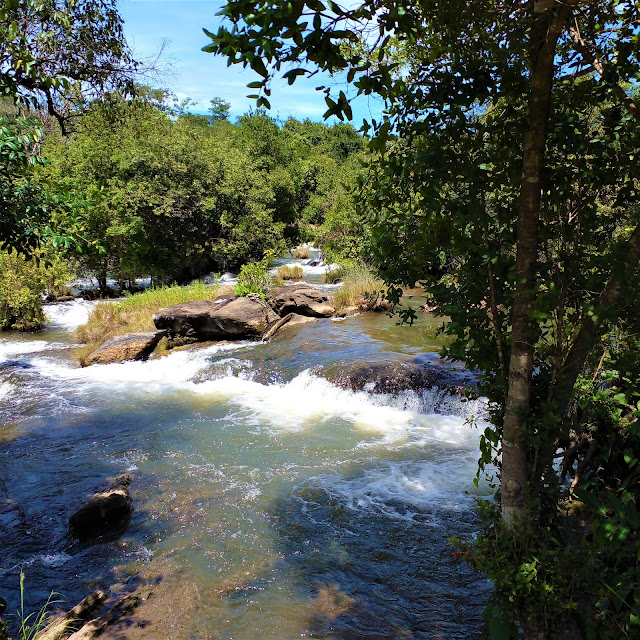What a delight to come back during the full-fledged presidential race, with only five months left until the BIG DAY! Am I excited? Well, I will explain how I feel about this...
I rarely watched television while being away for two years. The only news source I relied on was Facebook news streams from NPR-like sources and my friends' comments on the goings-on back home. I maybe caught a glimpse of Trump two times on the television. That was enough for me, really, and to come home and have his name mentioned several times per day and his blabbering monologue continuing on and on; I realized this is a freakin' joke that has gone too far.
So, I came back home with the idea people would want to know all about my service. I spent two years living in a remote village in Africa - no electricity or indoor plumbing. I expected to be bombarded with questions about my life abroad, only to find few who are actually interested enough to ask specific questions about my service.
I want to let you know that I was at celebrity status in my village, living in Zambia with primarily black people. I would walk down the street hearing my name called out by children and sometimes adults, with them expecting a greeting or wave from me. My friends always welcomed me warmly, even if I had just seen them before. The presence of friends was always a gift. Friendship was not superficial in any way.
I came back from a place where I could strike up a conversation with just about anyone while walking down the street, even complete strangers, and sometimes make connections for future projects or friends who will be friends for life. I would also learn a lot from others. Women, children, men... It didn't matter who I spoke with. I would learn something new about the world I lived in.
Here is an example of striking up a conversation with just anyone: I was in Livingstone for Christmas vacation, visiting Victoria Falls with some friends. I debated whether to leave early the next day because my money was running short.
As I was hiking up a trail from the bottom of the falls, I passed a man. He and I talked about being fit enough to hike fast up the hill we were climbing. Eventually, I asked him where he was from. He was from the Copperbelt and getting ready to leave for home the next day. He had a car. I wondered if I could come along to forgo taking the dreaded crowded bus ride that takes 12 hours and ride in a comfortable car with great conversation. It worked out. Just randomly speaking with a stranger would make the most significant difference in my life at times, usually in a positive way. If fact, I take back calling people I don't know in Zambia strangers. We aren't strangers; we are people who are open to being friends with one another. The word stranger has a negative connotation to it. There is nothing negative about people you don't know in Zambia.
Here in America, I have to go back to keeping to myself and regarding most people as strangers. I have struck up conversations with a few and learned many things from those people, something I would never know otherwise, and I made a friend. But, of course, I would never get a ride with a person I just met that way. It is different here. Very different.
What makes returning hard?
The culture change: wasteful, lacking simplicity and community, but what about showers and all of the conveniences? I had gained 30 pounds in three months.
I see things differently. Where I came from, there wasn't gun violence; people didn't watch television.
I am more sensitive to veterans and their difficulties when they come home. There is a belief among Americans that America is the BEST PLACE IN THE WORLD!!!!!! Is this place really home? What makes a place home? The people who care about you? The people who listen? Americans think they do all this, but they don't.
My kids are grown, I lost my best friend...my value for survival is diminished. No husband.
I'm not looking to start a family.
A couple of months before leaving my village in Zambia, I felt I should stay. My gut told me I should stay. But I resisted. I told myself I would go home and see how I felt, and then if I thought I needed to come back, I will. Well, I need to go back. I need to go back more than ever.
After waiting 30 years to go and live in Africa, why would I think it would be OK to come back? Why did I think that? I didn't give it any thought. Then, finally, two years were spent making a new home in a new place...and I thought I could come back to the States with no problem.
I remember the first night back, I had a dream of my village. I saw the children. When I woke, I had a sob fest. I can't remember ever sobbing before. I've cried but not sobbed. Sobbing is different.
From then on, I struggled to get used to everything. It took a while to get used to or tolerate going to the supermarket. I never watch television. I can't stand it anymore. I feel like I'm in the spotlight. It's funny because that's how I felt when I first went to Zambia. And I really was in the spotlight. Everyone watched and stared at me. But, I got used to it in Zambia. Over time people got used to me, though; they knew I was still there. I'm not stared at here, but I don't feel like I belong. I feel like I stand out. But no one notices. No one notices I'm even here.












































